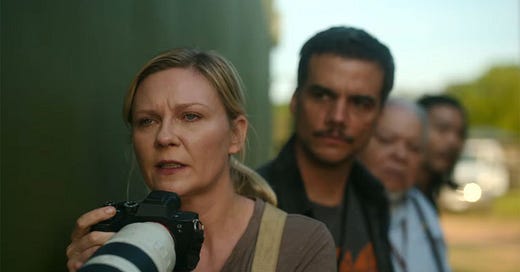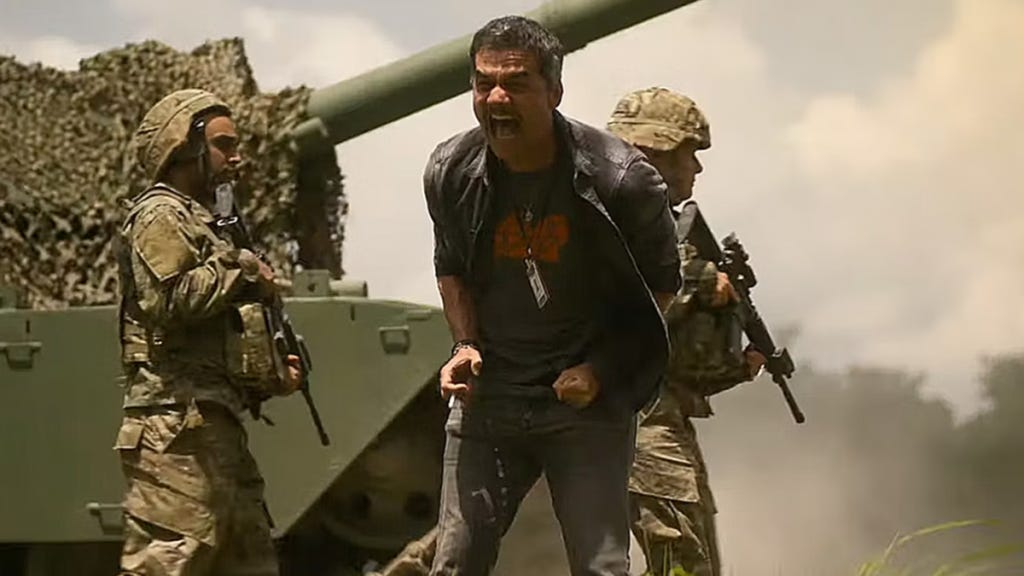*a few spoilers ahead*
The idea of Texas and California agreeing so strongly on something to go to a literal war for may feel far reaching. But, something would have to be so terrible, so cruel, so awful to create a world where these two stereotypically different states are on the same team. This is the case in Alex Garland’s Civil War. A film focused on the odyssey of team of journalist en route to D.C. amidst the destruction of their country due to a civil war with no exact knowledge of how we got here. Rather, Civil War is film that does not focus on one political group or people, but on the horrors of war and what it does to us.
When the trailer first dropped in December, Film Twitter was in agreement that this story would be “too on the nose”, considering today’s current political climate. Yet, Garland creates a plot where politics have no real driving force or importance in his story. The journalist we follow have been in the world of war journalism prior to this civil war in the states, and almost have numbed out to the atrocities and death they report and capture. Only one young photographer among the group still has a tender and sensitive spirit towards what she witnesses, which makes a stark contrast against the rest. During their journey to the nation’s capitol we are introduced to an array of characters who represent the many ways people respond to war.
Some take up the cause with much pride for their nation and a “take no prisoner” mentality. We see this with the armed and baseball hat wearing men at a local gas station with two former travelers hung in the car wash in the background. As an audience we are left with no understanding, and only subtext, as to what lead these men to due such a random act of violence. We get our gas, and proceed with caution and bewilderment of “how did we get here?”
Others live in a chosen state of denial and apathy. Our team of journalist roll into a town that almost was stuck in time which is in opposition to the shots of abandoned car pile ups, smoke from afar, and desolation on the stretch of road from New York to West Virginia. Instead, this town is vibrant in green grass and women cheerfully walking their dogs and children playing outside. A glimpse of what was. We are introduced to a local shop owner and the journalist ask, “you are aware there is a pretty huge civil war going on all across America?” to which she looks up from her book, shrugs, and replies, “yeah. But, we just try to stay out…its for the best” and is back to her world of reading. The sense of passivity is palpable.
Our lead photo-journalist, Lee, played by the sensational Kirsten Dunst, reveals much to us about those who’s job it is to share with the world what is tragically occurring in these war zones. The toll it takes on journalists to witness some of the world’s worst atrocities and to document it with many not even batting an eye or doubting the credibility of it. Yet, it is the journalist who keep the story going. Who keep the truth leading in times when truth can feel murky and almost hearsay. Journalist take us to the frontlines of a world many of us on this side of the world will never have to encounter.
Civil War reveals to us the violent anger, apathy, and mental anguish war can wreak on so many, without any mention of politics. War creates a world where it is an “us vs. them” mentality, where people have to flee their homes in the middle of the night for safety, where families are separated without the certainty of being reunited again, and death is always sneakishly looming. It is a sobering reality for many across our world.
I leave the theater with one question, “how can I be a vessel that promotes peace, truth, and love from here?”
God, help us.
Blessed are those who work for peace. Matthew 5:9




